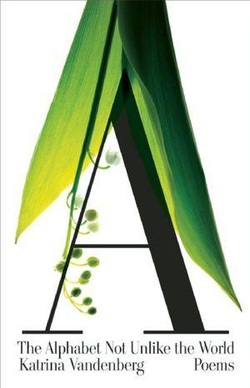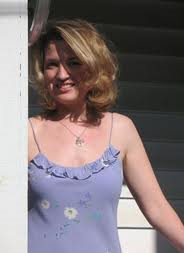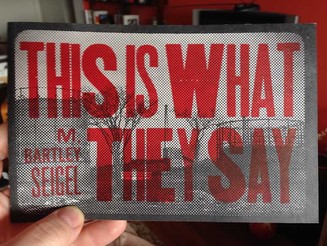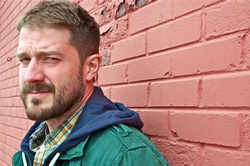Matthew Thorburn, Poet - Author of Dear Almost
Menu
 The Alphabet Not Unlike the World (Milkweed, 2012) is Katrina Vandenberg’s second book of poems. She is also the author of Atlas (Milkweed, 2004) and co-author, with Todd Boss, of the chapbook On Marriage (Red Dragonfly Press, 2008). She teaches in the Creative Writing Programs at Hamline University in Saint Paul, Minnesota and lives four blocks from campus with her husband, novelist John Reimringer, and their daughter Anna. Q: How did The Alphabet Not Unlike the World come together as a book? Did you set out to write a book of poems about the alphabet? Or did you write certain of these poems and then begin to see the shape a collection might take around them? I’m curious to hear about your process. A: Slowly. Partly because I wrote it in a six-year period while I was both trying to start a family, and publishing and promoting my first book, Atlas. The publication of Atlas had been swift, sudden, and unexpected; the child-bearing was slower, anxiety-inducing, and involved miscarriages, surgery, and hormone crashes. The book had two false starts. At first it was meant to be about my first partner Tim’s trip to Ireland after we graduated from college. I went to Ireland alone the summer before Atlas came out and, using his old travel journal, retraced his steps. Within a week there I knew I couldn’t write that book; it was his trip, not mine. Atlas was a book about grief, but when I published it, I closed the door on that part of my life. Then, the book was about adolescence and what it means to be a girl. It wasn’t until I was at the Amy Clampitt House in Lenox, right after we met at the Sewanee Writers’ Conference, that I began to write the alphabet poems; the bulk of the book was written in late 2008 and early 2009. So for me, a big challenge was trying to figure out how all these poems from three disparate projects fit together, if they did at all. There is an enormous cast of characters. Finally I saw a connecting thread: this is a book about forgiveness. I owe my first editor, Jim Cihlar, for helping me structure it in a way that created a coherent narrative. He had suggested that the first section be a sort of précis, showing the arc of the book in miniature. Q: There are several ghazals throughout the book, which help tie it together—and which are all letter poems, like “Prologue: A Ghazal” and “Z Ghazal,” the two that bookend the collection. What drew you to this particular form? A: When I got interested in writing about the letters’ history as pictures, I initially wanted to write all the letter poems as ghazals. The form felt right, and I liked that it came from the same part of the world that the letters did, though the form isn’t as old as the letters themselves. After writing a few, that window closed, and the alphabet poems started pushing into other directions, though if you look at the Q poem in particular, you can still see the ghost of the abandoned ghazal. Probably an entire book of alphabet ghazals would have been obnoxious. Q: One of the things I love about your poems is the way you include so much lived life and vivid visual detail. The poems are always about something—actually they are always about several somethings. I’m wondering, how does a poem start for you? Are there certain things that will trigger a poem or give you a way into a new poem? A: Sometimes it’s a line: “A Ghazal” started with my getting this line stuck in my head: “it is strong enough to pull the train of letters through the poem.” The poem “X” began with the phrase “I promise to write a poem about forgiveness. Even if this, even if that.” Other times, I get a prickly feeling in my head or a queasy feeling in my gut, and I know that I want to spend some writing time exploring an image or a memory or a word. I give my students prompts and poem ideas, and sometimes try them out myself — in particular, we sometimes play a game in which we force metaphors between two things we’ve been meaning to write about, just to see what happens — but really, my best poems begin in a way I can’t control and can’t explain. Mary Ruefle has an essay in Madness, Rack and Honey about how little is said about where poems begin, because no one knows. I can’t teach my students how to have that prickly feeling, only to respect it. Q: On a related note, these poems—especially the ones about individual letters, such as “X”—are filled with facts, trivia and snippets of history, yet this information feels entirely owned and embodied in the poems. There’s never that research-paper feeling of trying to squeeze all the relevant info in. I wonder if you could talk about what part research (however you’d define that) played in writing the poems, and how you translate research into poetry. A: Some of that is the kind of person I am, one who likes to know a little bit about a lot of things. In general, I think that, when it comes to research in a poem, one of two things has to happen. Either you have to have known the piece of information long enough that it has time to compost inside you and become yours. Or, the revising of a poem with research in it has to involve a lot of subtracting — pulling out and pulling out the extra show-offy bits. It’s surprising how small a kernel of research in a poem needs to be. But it also has to be the right snippet, so when I’ve used research, I’ve found that I progressively chisel away at it. I’m a slow writer, which might help in this case.  Q: In addition to being a poet, you’re also a mother and a teacher. As a new parent myself, I’m curious to know how you balance those three roles and manage to play all three? A: Badly? Or maybe it’s just always a work in progress. I talked about this a bit with the poet Molly Sutton Kiefer, on her wonderful blog Balancing the Tide: Motherhood and the Arts. The interview is here. But when I told her all of this, my child wasn’t walking yet, so I didn’t know the half of what it meant to teach, write, and parent a little person whose job is to get into everything. Students, writing, family — any one of these is willing to take everything you can give and then some. I’m a big list maker, I get up earlier than I used to, I’m willing to shell out as much as I can afford for child care. I have a spouse who truly co-parents. I’ve also had to acknowledge in the last 2-3 years that because my family is at the center of my life, I am willing to take the hit that comes from sitting on the sidelines a bit more, poetry-wise, while my daughter is small and needs me. I don’t think it anti-feminist or anti-art. I do think it’s very human, and my writing and teaching will ultimately be rewarded by it. Q: Lastly, what’s next? What are you working on now? A: These things never make sense when you describe them instead of just showing them to someone — who said that it’s impossible to paraphrase a poem? — but I’m working on a piece called Conservatory. It’s in the stage of its development where I’m not totally sure what it is, a book-length poem, a piece that bends genre, or both. It’s inspired by the source of our sanity as parents of an active toddler who lives in the frozen north. In the Marjorie McNeely Conservatory in Como Park, it is never winter. Two poems from The Alphabet Not Unlike the World: X I promise to solve for X. I promise I will write a poem about forgiveness. Even if it is April and another college boy has drowned in the Midwest. XX means “girl,” XY means “boy.” A serial killer, some say. Others: The boys are drunk and we have rivers. We also have rails, trestles in fields of corn, steel mills. A restless moon, a horizon you can see clear to, crows on telephone poles like Xs strung together. As unfertilized eggs we all begin as XXs. Even if we have lost dozens in the Mississippi, eight in LaCrosse alone, this poem is about forgiveness. It tries to solve for X—X the cross, X the Christ, X to X things out. The boy in Saint Cloud. The boy at Saint John’s, where the monks bake bread and copy the Bible by hand. When the moon is dark and new. X the unknown, X for times. X for ten, for more than ten. On the Web site’s map, the gravestones marked with little crosses pop up along I-94 like crocuses, until you can’t see one for another. It is Easter. The red-winged blackbirds are coming back to Minnesota, their wings’ tips feather the river along. The river is a swish of calligrapher’s ink, the boys are drowning inside the X-- X for stranger, Mr. X. I love the Mississippi, how it can mirror back the world without us in it. How it keeps insisting to the bluffs, Sandstone-- river—limestone—river—shale—river—river. The river of thoughts about Mr. X has worn through us almost that long. XO, I kiss you, the letter is sealed. I do not want to die without lifting a child of my own from the water. Earthworms It is raining again this morning. I remember it rained then, too, that summer morning we lay crosswise on the bed, the curtains grazing our heads, quickened by the damp wind. Outside, the earth was opening and the worms had surfaced, blind. They have eaten every bit of dirt that makes our yard. In bed at night, we turn the story of the child whose heart we never heard, the child who never heard rain. And we don’t care, we let it surface—we open ourselves, from time to time, to happiness.
0 Comments
Don't you find, after finishing a good book, that you'd like to ask the author a few questions and continue the conversation? Me too. This is the first in a series of conversations I hope to have with the authors of books I enjoy reading. I call this What are You Reading? because whenever I talk to a friend that's the question we always ask each other. Here are my answers to that question, the books I'm enjoying and recommend you check out.  First up is This is What They Say, a collection of prose poems by M. Bartley Seigel, published by Typecast in 2012. Seigel is the founding editor of the critically acclaimed literary magazine [PANK]. He lives, writes, and teaches in Houghton, Michigan, where he is assistant professor of creative writing and diverse literatures at Michigan Technological University. This is What They Say is his first book. Q: How did This is What They Say come together for you? I’m curious about how these poems evolved into a book. Did you set out to write a collection of prose poems, or did you write a certain number and begin to see a larger arc to the work, or…? A: A certain number materialized and then momentum took over. Jen Woods at Typecast was instrumental as an editor, as well, helping to cut through a lot of the fat I'd built up on the page, get down to the bone. I suppose a collection was always in the back of my mind, but the poems that appear in the book were mixed among many others published in lit mags over the years. It was very slow and organic, bringing the thing into focus. Q: I’m also interested in the choice of the prose poem as a form. Were these always prose poems, or did you try breaking them into lines at any point? Did you feel the form enabled you to do something you couldn’t do in lines, or couldn’t do as effectively? A: Some started as prose while others were broken down. I settled on prose as a form that cut through some of the perceived bullshit of poetry, by which I mean the artifice that keeps many readers at bay. I write a lot about very bare bones people in bare bones circumstances and burying that under a heavy handed prosody just never felt right to me, at least not with these particular poems. Q: The book is dedicated to the “people and places of Montcalm County, Michigan, from a time when I called it home,” and one of the things I love about this collection is the strong sense of a lived environment—a specific landscape and culture, a tangible place. As the dedication suggests, there’s also a kind of looking back going on in the poems. Did you need that distance of time and space in order to write these poems? And what was that looking back like for you as a poet? A: I dwell a lot in memory and mythology and the particular kind of fantasy those two combine to form, particularly in my poems. I've always been very taken with the idea of nostalgia, especially in its original sense, combining ruminations of home with a certain pain or anxiety or melancholy or loss, something more akin to phantom limb syndrome than to any kind of sentimentality, but always, always deeply romantic. And yes, it takes some time and distance from a period and place for that thing to build, I suppose. Q: As someone fascinated by narrative strategies and choices, I also noticed right away (and admire) the fact that the book is written from the first-person-plural point of view. It’s a “We” speaking to us—and in some ways for us—in these poems. Could you talk about this choice and what it does for the poems? A: I often find emerging and contemporary poetry very galling due to its deeply myopic confessional. I often find myself thinking, as I read a poem, who cares about this BUT the poet talking to herself? No one. Sure, sure, finding the universal in the personal and all that, but at a certain point it's just the worst kind of narcicism. No wonder poetry is in the straights it's in (though to be honest, I'm ok with poetry's "straights"; it seems to be doing quite well despite all the hand wringing to the contrary). I wanted to harken back to my perceived sense that poets used to speak for people other than themselves (that's probably not even really true, right?). "We" is a pretty simple way to do that. Then, of course, there was a sense in the book that the people to whom I'm speaking and speaking of aren't often allowed to speak for themselves and I wanted to play with that, turn it on its head, as much as I could.  Q: In addition to being a writer, you’re also a father, a professor, and editor of the literary journal [PANK]. As a new parent myself, I’m curious to know how you balance all of these roles and manage to play all four? When and where do you find time to write? A: I'm not writing much at this exact moment, to be honest. And my wife is a writer/professor/parent/spouse, too, which is to say, most days, we barely keep shit from burning down around us, and that's good enough. I turn 40 this year. I'm going to be living in Estonia for a year starting in August, teaching at Tartu University. This spring, I'm mostly doing yoga, painting rooms in my house, playing ukulele, rearranging my furniture, teaching, editing, cooking earthy meals involving a lot of lamb and butter, drinking red wine, sitting around on my ass in candlelight, watching the new season of Vikings, reading, and engaging as deeply with my marriage and my kids as I can, looking forward to the upcoming mountain biking season. The writing will either happen and be a part of that or it won't. I'm cool either way. Q: Lastly, what’s next? What are you working on now? A: Besides moving to Estonia next academic year? I want to build a sauna in my basement. I'd like to start keeping chickens again; I really enjoyed that when I did it before. I'd like to get another dog; my last dog died last year. Writing-wise, I've got a batch of little gritty love poems I should probably shop around. And there's been an essay collection percolating for a couple years I should probably crank on. Honestly, though, I don't know. We'll see, I guess. Two poems from This is What They Say:
We lie sullen in the dark, arms thrown over our eyes, breathing in the other's breath. It takes no small process to dislodge ourselves from each other, our sheets, to cross the floor barefoot without upsetting floorboards or children. Then kettles, faucets, stove tops, cups, refrigerators, cartons of bad milk, all our little explosions. This is a kind of seduction, too, though we seldom see it. We are all paper dolls. We are all scroll work and the creative use of light. Out the window there's fog on the hills while inside there's the smell of chicken bones, cat boxes, kerosene, the coffee burning. In our pubic beards, the smell of each the other's body. But all we can think of is avoidance and even this thought-crab crawls out our ears, out through our half open windows while we stand there, dead in our skins, hands limp at our waists, watching our dreams disappear into the darkening trees. After the terrible argument we will make love and afterward lie sullen on the bed, our bellies down, heads turned away. Life is all beyond us, and we will get up without speaking, without so much as a sigh, and go into the bathroom to draw a warm bath. We will listen to the sound of the splashing water. |
 RSS Feed
RSS Feed
